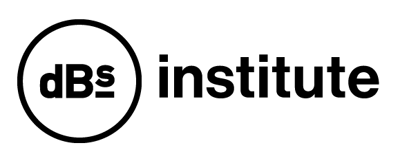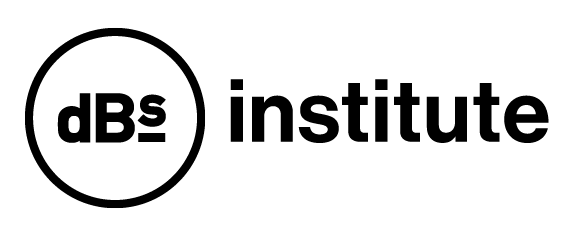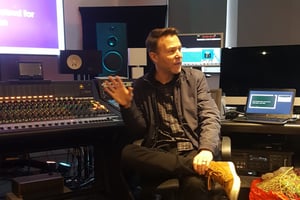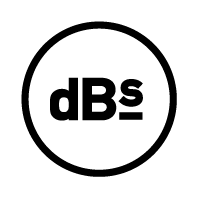With over 20 years of experience, David Cherry has accrued a long list of credits as both a Dubbing Mixer and Foley Artist and is fast becoming a familiar face at both our Plymouth and Bristol centres. We spoke to David about how he first got started, what a day in the life looks like for him and the best ways to get started in this exciting area of the industry.
Could you tell us how you first came to work as a Dubbing Mixer and Foley Artist and the journey that has led to where you are today?
I started out as musician with a real passion for sound and discovered that there was a different avenue for working in sound with television and film post production. I simply contacted all the post production houses in Bristol and eventually got offered a Runners position.
Cutting a long story short, I spent a lot of time with the sound department and got offered a Dubbing assistants job, which over a long period of time evolved in to a mixers role. I was also trained up in the early stages of being an assistant to be a Foley artist. I talk about this in my presentation and discuss with students various ways in to the industry.
Was this always an area of the audio industry that you’d been interested in working in?
To be honest, I never even thought about sound for television or film as I was so focused on music, so it's quite interesting when I look back now and think that I didn't even know this role existed and now I've been doing it for so many years.
As a dubbing mixer you work on a range of projects from natural history films to children’s TV. Does the process differ from project to project or are you applying the same process each time?
I definitely always apply the same processes for the small projects and the big budget ones.
The key thing is working out how much time to give each individual project. This just comes through experience. There is no other real way of learning that, unfortunately.
The beautiful thing about Foley is how open it is to your own interpretation and experimentation. Have there been any significant changes in the creative process due to technology, trends etc. or are you still creating just as you did when you first started?
Foley hasn't really changed that much through the years that I have been doing it. It's quite a bit quicker than when we used to record using digiBeta tape machines and obviously Pro Tools is such a quick editing tool that you don't have to wait as long as you used to for the recordist to check or fit any of the recordings for timing etc. It also it doesn't crash all the time like the old gear used to!
You've been involved in a lot of nature documentaries over the years. How does the Foley work differ from other projects?
Pretty much every sound you hear is created in the studio. For the recent BBC series Earth's Tropical Islands, everything was shot in mute so we had to recreate every sound that was appearing on screen. There are several libraries containing recordings of animal calls that we'll use, but there are some sounds that just aren't possible to capture such as small animals and insects. So anytime you see those kinds of animals or an animal interacting with its environment, those sounds are created by us.
What’s the strangest sound you’ve had to create in your time as a Foley artist?
There's been quite a few through the years and each new Foley session brings something interesting and sometimes bizarre. I think doing any Foley for animals mating can always be pretty strange, but also pretty funny.
With a growing prevalence of niche audio qualifications and advancements in technology the pathways into the audio industry have completely changed. Could someone still find their way into the industry as you did?
I still see that most people start out as runners. It's kind of an audition to see how you would fit in and your overall work ethic. However, I think by having an audio qualification you stand in much better stead of getting a runners job if the post house are looking for an audio assistant in the future. Also by having an audio qualification you will be able to directly apply for an assistants role or a trainee sound editors job.
What are your must-have tools?
For mixing, definitely Pro Tools and the iZotope RX7 connect plugin. For Foley, oranges and pine cones.
For someone who’s never ventured into the world of field recording or Foley, what key tool would you say they need to get started?
For Foley work, the key tip is to gather up as many 'go to' props that you like and know always work. This just comes through constant practice and experimentation. There are also various clips and websites where Foley artists give tips on props but I also recommend finding your own style and sound. Very much like a musician would.
What’s been your proudest moment so far?
One of my most recent Foley projects - BBC Earth's Tropical Islands turned out really well. It's still on iPlayer (link to series), so worth a watch to listen out for all the Foley as we covered everything in each episode.
Also, I suppose getting a sound team BAFTA nomination for Life In the Undergrowth was good because my Foley work for NHU films is never credited on the actual programmes so it was nice to get some acknowledgment and it was a good party after!
Any final tips for someone who is interested in working in this area of the industry?
Keep experimenting in Pro Tools, try and find your own unique set of sounds, Keep up to date with the current tech and workflows.
Keep up to date with the post houses that you want to work for and keep mailing them for work experience and jobs.
Most importantly of all, find your own style and sound so that you stand out and bring something new to projects and post houses.
Where can people find out more about you and the work you do?
I quite often post on LinkedIn about current mixes and Foley sessions, so feel free to connect with me. There is also list of some of my work on IMDB and Doghouse Post Production post projects that I am working on as well as their transmission dates.
FIND OUT MORE
Careers in Sound: Foley Artist/Dubbing Mixer
Doghouse Post Production
IMDB
LinkedIn



